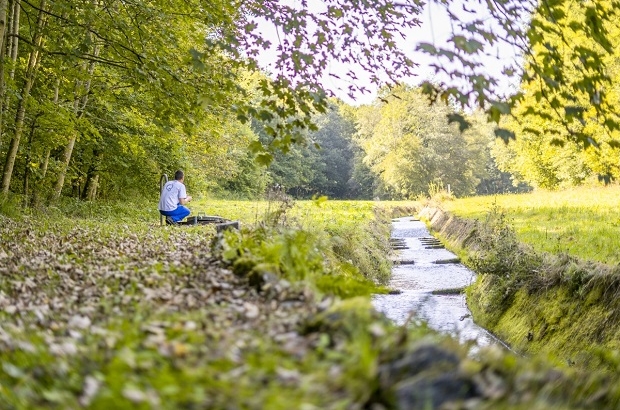- Daily & Weekly newsletters
- Buy & download The Bulletin
- Comment on our articles
Level of Brussels' waterways significantly reduced amid drought concerns
The water level in Brussels waterways has dropped considerably due to lack of rain in the past few months, according to Brussels Environment.
While no stream or river is yet running dry or drinking water supply in danger, Brussels water company Vivaqua has imposed restrictions on drawing water from the Meuse as a precaution.
All seven of Brussels watercourses and the canal have seen declines in their water level.
“The heat reduces the oxygen level in the water and that alone can be fatal for fish in the watercourse,” Benjamin Thiébaux, project manager at Brussels Environment, told Bruzz.
“It can also happen with pollution, when sewers overflow into watercourses during heavy rain. We monitor whether there are any problems, but so far there haven't been any.”
If a brook were to run completely dry, it would essentially wipe out the watercourse’s entire ecosystem. Most at risk for now is the Molenbeek, which flows through the King Baudouin park in Jette.
“The water level there has dropped by 80% or so, 10 to 15 centimetres,” said Thiébaux.
“Small streams like the Molenbeek or the Woluwe are naturally more sensitive to drought than the Zenne, which is only struggling with something like a 10-15% drop in water.”
While such falls in water levels don’t occur every year, they are more or less regular, “and a little more frequent in recent years, due to climate change,” says Thiébaux.
“That's why our department is working on the resilience of these waterways: we provide deeper sections or sections with more shade from surrounding vegetation, where fish can hide during heat waves.”
Water restrictions won’t affect drinking supply
In the meantime, Vivaqua is taking less water from the Meuse as a precaution.
“For a few days now, we've been allowed to extract less water from the Meuse to turn into drinking water: instead of 240,000 m3/day, we can now only draw 120,000 m3/day from the river,” said spokesperson Saar Vanderplaetsen.
“But the restriction has no impact on drinking water extraction, because we only draw 90,000 m3/day from the river.”
Vivaqua gets the rest of the water it needs for Brussels from 26 groundwater sites, where reserves are fully replenished and at a good level after last year's wet summer and rainy winter.
“Virtually all the sites are in Wallonia, the largest being in Modave,” Vanderplaetsen explained.
“Only 1% of Brussels' drinking water actually comes from the region, from groundwater reserves under the Bois de la Cambre and the Sonian Forest. So there is no reason to panic or worry, but in the medium term we are looking out for alternative water sources.”
Belgium is currently experiencing a period of very little rainfall. The drought index of the Royal Meteorological Institute (RMI) indicates that the country is “still in a dry scenario, a trend that will continue for the next 10 days.”



















